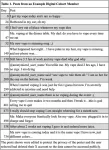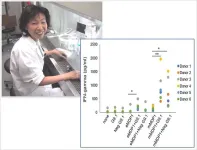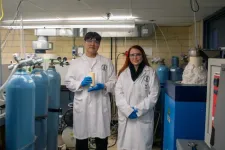(Press-News.org) Tapping into the vast amount of data now available on social media, a new study from scientists at the University of California San Diego introduces a powerful new approach to understanding the nation’s health, in this case the vaping epidemic.
The study, published in the American Journal of Preventive Medicine on June 19, was led by John W. Ayers, Ph.D., from the Qualcomm Institute within UC San Diego.
“Researchers studying social media have tended to analyze the frequency and content of posts,” said Ayers, who is deputy director of informatics at the Altman Clinical and Translational Research Institute, vice chief of innovation in the Division of Infectious Disease and Global Public Health at UC San Diego School of Medicine, in addition to Qualcomm Institute scientist. “While this can highlight trends and patterns, a longitudinal study that follows a group of the same individuals over time—a cohort—is considered the gold standard of observational scientific evidence. We have introduced a way to create a ‘digital cohort’—a 21st century evolution of this important technique—to study e-cigarette vaping behavior, including how long it typically takes to show signs of addiction, experience adverse effects and try to quit.”
“Cohort studies have been the backbone of medical knowledge,” said Davey Smith, M.D., chief of the Division of Infectious Disease and Global Public Health and professor in the UC San Diego School of Medicine, co-director of the Altman Clinical and Translational Research Institute at UC San Diego, and study co-author. “Despite their value, cohort studies are incredibly resource-intensive and time-consuming to conduct. With our digital cohort approach, we can study populations at an unprecedented scale by leveraging the wealth of data people are organically sharing on social media platforms.”
In fact, Ayers notes, the current study could be considered the largest cohort study in medical history.
Applying the Digital Cohort Method to Vaping
As a case study for the new approach, the researchers used their digital cohort approach to study e-cigarette vaping behaviors. From over 19 million vaping-related tweets, they identified 25,112 X (formerly Twitter) accounts that mentioned vaping in at least 10 posts, creating a digital cohort with a combined 43.8 million person-days of observation.
Among the concepts revealed in following individual cohort members (Table 1) are vaping initiation; product hacking; signs of addiction; responses to peers who support or discourage vaping; adverse health effects from vaping; and cessation intentions, attempts, and resolutions.
To leverage these data for scientific insights, the research team analyzed an aggregated sample of data. Among randomly sampled accounts belonging to people who vaped, the researchers found that 27% reported making an attempt to quit during the study period. Of all first quit attempts, 26% were successful. Among those with a failed first attempt, 13% went on to make an additional quit attempt, with a 36% success rate. On average, people made their first quit attempt 531 days after their earliest vaping post. If that attempt failed, a second attempt typically came 361 days later.
"These findings give us a lens into the vaping cessation journey that has been difficult to obtain through traditional research methods," added Ayers. "By tapping into the real words and experiences of people who vape, this approach can guide more timely and effective public health interventions."
Building the Next Digital Cohort
The vaping study, funded by the University of California’s Tobacco-Related Disease Research Program and Burroughs Wellcome Fund, represents just the first application of this digital cohort approach. The research team plans to rapidly expand by creating digital cohorts around other critical health issues in collaboration with decision makers.
"Given recent declines in life expectancy and general worsening of our population’s health, now is a critical time to increase the amount and timeliness of data guiding public health decision-making," added Smith. "Our digital cohort method can help make medicine and public health more data-driven, responsive and, hopefully, more effective."
The power of digital cohorts lies in their ability to rapidly study any health topic discussed on social media platforms. "Digital cohorts can be applied to many diseases, conditions, behaviors or outcomes, if they are mentioned publicly online," said Michael Hogarth, M.D., study co-author, professor in the Division of Biomedical Informatics and co-director of the Altman Clinical and Translational Research Institute at UC San Diego. “In the process, we are able to reflect patients’ lived experience.”
The team emphasized the democratizing potential of this approach. "Our current healthcare research priorities have been tied to legacy data collection processes that can take months, and sometimes years, to complete,” concluded Mark Dredze, Ph.D., the John C Malone Professor of Computer Science at Johns Hopkins University and study co-author. “Our approach presents an alternative in which scientists can apply proven epidemiological methods in this new digital realm. This allows us to rapidly identify and characterize emerging health issues in a data-informed manner."
In addition to Ayers, Smith, Dredze and Hogarth, authors of the American Journal of Preventive Medicine paper, “A Digital Cohort Approach for Social Media Monitoring: A Cohort Study of People Who Vape E-Cigarettes” (AJPM doi:10.1016/j.amepre.2024.01.016), include Adam Poliak, Ph.D., an assistant professor of computer science at Bryn Mawr College; Nikolas R. Beros, a student research intern at UC San Diego’s Qualcomm Institute; and Michael Paul, Ph.D., a consultant for the UC San Diego’s Qualcomm Institute.
END
Study uses powerful new ‘digital cohort’ method to understand vaping epidemic
The first major innovation for cohort studies in decades, the new technique leverages social media and opens up an entirely new way to conduct population health research
2024-06-19
ELSE PRESS RELEASES FROM THIS DATE:
A new tuberculosis vaccine candidate recombinant protein with additional post-translational modifications occurring in Mycobacterium tuberculosis cells
2024-06-19
Niigata, Japan - Tuberculosis is still one of the deadliest infectious diseases, causing over one million deaths each year worldwide. Additionally, about one-fourth of the world's population carries Mycobacterium tuberculosis (M. tuberculosis) without showing any symptoms, and most of these carriers do not develop the disease.
The current anti-tuberculosis vaccine, BCG, is administered worldwide. However, considering that more than 10 million new tuberculosis cases are reported each year, its effectiveness is deemed ...
Experts converge at USC Music, Health, and Policy workshop
2024-06-19
USC recently hosted its first Music, Health, and Policy workshop as part of Los Angeles County Arts and Health Week, filling Joyce J. Cammilleri Hall on the University Park Campus.
Event organizer Assal Habibi, an associate professor at the Brain and Creativity Institute at the USC Dornsife College of Letters, Arts and Sciences who explores the intersection between music and the human brain, brought together a wide range of experts on the importance of art and its effect on human development and well-being.
“The workshop aims to bring people together ...
Private school and/or ‘higher status’ university education linked to better mid-life health
2024-06-19
A private (fee-paying) school and/or a ‘higher status’ (Russell Group*) university education may be linked to better mid-life health—at least in the UK—suggests research published online in the Journal of Epidemiology & Community Health.
Alongside the level of education achieved, the type of educational institution a person attends may also influence subsequent health outcomes, suggest the researchers.
Published research to date indicates that educational attainment is associated with better subsequent health. But other aspects ...
Heavy resistance training around retirement preserves vital leg strength years later
2024-06-19
Twelve months of heavy resistance training—exercise that makes muscles work against a force—around retirement preserves vital leg strength years later, show the follow up results of a clinical trial, published online in the open access journal BMJ Open Sport & Exercise Medicine.
Depletion of leg muscle strength is regarded as a strong predictor of death in older people, so is important to maintain, say the researchers.
Skeletal muscle mass and function naturally decline with advancing age, ultimately often interfering with mobility and autonomy in older people, note the researchers.
Resistance training, which ...
Illinois-led study reveals stable soil moisture variability within fields and opens the door for satellite remote sensing for future measurements
2024-06-19
A multi-institutional study led by University of Illinois and Agroecosystem Sustainability Center (ASC) scientists concluded that, although soil moisture varies significantly both within a single field and from field to field due to varying soil properties and different management practices, soil moisture distribution relative to the field average remains consistent across time within each field.
Over three years, the team used sensor measurements and a high-density campaign to reveal that the drier areas remain the drier areas and the wetter areas remain the wetter areas. The study also deduced this finding, reliable estimations of ...
Shining light on mental health in space science community
2024-06-19
The severity of anxiety and depressive symptoms in the planetary science community is greater than in the general U.S. population, according to a study led by a University of Hawai‘i at Mānoa scientist and published this week in Nature Astronomy.
“After reading about so much anxiety and depression in academia, and as someone who loves both planetary science and psychology, I felt like I needed to do something because there are so many people suffering,” said David Trang, an assistant researcher in the Hawai‘i Institute of Geophysics and Planetology in the UH Mānoa School of Ocean and Earth Science and Technology at the ...
Texas A&M researchers investigating the impacts of space travel on astronauts’ eye health
2024-06-19
As space travel becomes more common, it is important to consider the impacts of space flight and altered gravity on the human body. Led by Dr. Ana Diaz Artiles, researchers at Texas A&M University are studying some of those impacts, specifically effects on the eye.
Gravitational changes experienced by astronauts during space travel can cause fluids within the body to shift. This can cause changes to the cardiovascular system, including vessels in and around the eyes.
As the commercialization of space flight becomes more common and individual space travel increases, astronauts will not be the ...
UCSB's Haewon Jeong receives an NSF Early CAREER Award
2024-06-18
(Santa Barbara, Calif.) — Haewon Jeong, an assistant professor in UC Santa Barbara’s Electrical and Computer Engineering (ECE) Department, experienced a pivotal moment in her academic career when she was a postdoctoral fellow at Harvard University. She was investigating how machine learning (ML) models can discriminate against students in education-related applications. Discrimination, or bias, occurs when a model used to train algorithms makes incorrect predictions that systematically disadvantage a group of people. Bias in ML models can lead to inaccurate or unfair predictions, which can have serious consequences in fields such as healthcare, finance and criminal justice. ...
This new way to recycle steel could reduce the industry’s carbon footprint
2024-06-18
University of Toronto engineering researchers have designed a new way to recycle steel that has the potential to decarbonize a range of manufacturing industries and usher in a circular steel economy.
The method is outlined in a new paper published in Resources, Conservation & Recycling and co-authored by Jaesuk (Jay) Paeng, William Judge and Professor Gisele Azimi.
It introduces an innovative oxysulfide electrolyte for electrorefining, ...
Journal of Nutrition recognizes distinguished Texas A&M nutrition scientist
2024-06-18
MEDIA INQUIRES
WRITTEN BY
Laura Muntean
Paul Schattenberg
laura.muntean@ag.tamu.edu
paschattenberg@ag.tamu.edu
601-248-1891
210-859-5752
FOR ...
LAST 30 PRESS RELEASES:
Scientists discover why we know when to stop scratching an itch
A hidden reason inner ear cells die – and what it means for preventing hearing loss
Researchers discover how tuberculosis bacteria use a “stealth” mechanism to evade the immune system
New microscopy technique lets scientists see cells in unprecedented detail and color
Sometimes less is more: Scientists rethink how to pack medicine into tiny delivery capsules
Scientists build low-cost microscope to study living cells in zero gravity
The Biophysical Journal names Denis V. Titov the 2025 Paper of the Year-Early Career Investigator awardee
Scientists show how your body senses cold—and why menthol feels cool
Scientists deliver new molecule for getting DNA into cells
Study reveals insights about brain regions linked to OCD, informing potential treatments
Does ocean saltiness influence El Niño?
2026 Young Investigators: ONR celebrates new talent tackling warfighter challenges
Genetics help explain who gets the ‘telltale tingle’ from music, art and literature
Many Americans misunderstand medical aid in dying laws
Researchers publish landmark infectious disease study in ‘Science’
New NSF award supports innovative role-playing game approach to strengthening research security in academia
Kumar named to ACMA Emerging Leaders Program for 2026
AI language models could transform aquatic environmental risk assessment
New isotope tools reveal hidden pathways reshaping the global nitrogen cycle
Study reveals how antibiotic structure controls removal from water using biochar
Why chronic pain lasts longer in women: Immune cells offer clues
Toxic exposure creates epigenetic disease risk over 20 generations
More time spent on social media linked to steroid use intentions among boys and men
New study suggests a “kick it while it’s down” approach to cancer treatment could improve cure rates
Milken Institute, Ann Theodore Foundation launch new grant to support clinical trial for potential sarcoidosis treatment
New strategies boost effectiveness of CAR-NK therapy against cancer
Study: Adolescent cannabis use linked to doubling risk of psychotic and bipolar disorders
Invisible harms: drug-related deaths spike after hurricanes and tropical storms
Adolescent cannabis use and risk of psychotic, bipolar, depressive, and anxiety disorders
Anxiety, depression, and care barriers in adults with intellectual and developmental disabilities
[Press-News.org] Study uses powerful new ‘digital cohort’ method to understand vaping epidemicThe first major innovation for cohort studies in decades, the new technique leverages social media and opens up an entirely new way to conduct population health research





